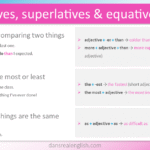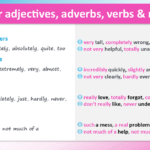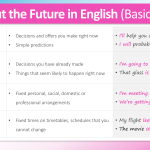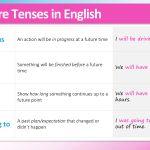Verb patterns in English
Do you know what verb form should come after a verb like “enjoy“?
Should you say “I enjoy driving” or “I enjoy to drive” – or “I enjoy drive“?
Knowing which verb to use after another verb can be confusing.
This free English grammar lesson will help you learn how to form common verb patterns in English.
Understanding Verb Patterns
When two verbs come together in a phrase or sentence, the first verb affects the form of the second verb.
The second verb can be either the to-infinitive, the -ing form, or the base form of the verb:
| Verb 1 | Verb 2 |
| learn | to drive (to-infinitive) |
| enjoy | driving (-ing form) |
| must | drive (base form) |
Here are the five most common verb patterns with examples and common verbs:
1. Verb + to-infinitive
Use this pattern after verbs like:
decide, hope, plan, want, learn, offer, promise, refuse, need, expect, choose, agree, fail, pretend, manage.
Structure: verb + to + base verb
Examples:
- He decided to leave early.
- We expect to win the match.
- She promised to come back.
- I hope to travel next year.
- They need to study for the test.
2. Verb + -ing (gerund)
Use this pattern after verbs like:
enjoy, avoid, suggest, admit, finish, mind, risk, deny, consider, recommend, keep, miss, practice, imagine, give up.
Structure: verb + verb-ing
Examples:
- They suggest going to the park.
- He denied taking the money.
- I miss seeing my friends.
- She keeps talking in class.
- We enjoy eating together.
3. Verb + object + to-infinitive
Use this pattern after verbs like:
advise, ask, encourage, invite, tell, expect, order, remind, want, teach, persuade, allow, force, warn, enable.
Structure: verb + object + to + base verb
Examples:
- I asked her to help me.
- They encouraged him to apply.
- She reminded me to call later.
- We told them to wait outside.
- The teacher taught us to read maps.
4. Verb + object + bare infinitive
Use this pattern after verbs like:
let, make, help, watch, hear, see, feel, notice, have, bid, observe, overhear.
Structure: verb + object + base verb (no “to”)
Examples:
- They let us go home early.
- I heard her sing a beautiful song.
- He watched them play football.
- She made me cry with her story.
- We saw him cross the street.
5. Modal verb + base form
Use this pattern with modal verbs like:
can, could, may, might, must, shall, should, will, would, ought to, needn’t, dare.
Structure: modal verb + base verb
Examples:
- You must wear a helmet.
- She can speak three languages.
- We should ask for help.
- They might leave early.
- He will call you later.
Verb Patterns in Context
Questions and negatives
Verb patterns follow the same structure in questions and negative forms. Helping verbs like do, does, did, or modals like should and must are used to form them.
Questions:
- Do you want to leave now? (to-infinitive)
- Should we ask them to join? (object + to-infinitive)
- Can you help me carry this? (bare infinitive)
- May I go early today? (modal + base verb)
- Have you considered moving abroad? (-ing)
Negatives:
- He doesn’t mind working late. (-ing)
- They didn’t let us stay long. (bare infinitive)
- You must not forget your ticket. (modal + base verb)
- She refused to talk about it. (to-infinitive)
- I don’t want to miss the bus. (to-infinitive)
Model dialogue
This conversation shows verb patterns in a group project.
- A: Can you help me carry this?
- B: Sure. I offered to help earlier.
- A: I heard you say that, but I didn’t want to bother you.
- B: It’s okay. The teacher told us to finish today. She reminded us to email the file too.
- A: We should start now. I don’t mind working late.
- B: I saw Sam leave earlier. He promised to come back later.
- A: Okay. Let’s try to complete it soon.
Short diary entry
This short entry shows verb patterns in daily life.
Today was busy. I needed to finish a report before 5pm. My manager asked me to check the data again. I kept working even when I felt tired. At 6pm, I heard someone knock on the door. It was Leo. We planned to meet at the coffee shop. I should text him tomorrow to say thanks. I also want to relax this weekend. It’s been a long week.
Verb patterns: common mistakes
Look at these common mistakes. Learn the correct forms by comparing each sentence.
- He suggested to go home. → He suggested going home.
- They made her crying. → *They *made her cry.
- I want that he comes. → *I *want him to come.
- You must to be careful. → You must be careful.
- She advised me go early. → She advised me to go early
Verb patterns exercises
Exercise 1: Complete the Sentences
1. I enjoy before bed. (read)
2. She promised later. (call)
3. We asked him us. (help)
4. They let us early. (leave)
5. You must careful. (be)
6. He finished his homework. (do)
7. They told me at the gate. (wait)
8. I saw him down the road. (run)
9. We plan next month. (travel)
10. She advised me a break. (take)
Exercise 2: Correct the Mistake
1. She made me to do it.
2. We decided going to Spain.
3. They invited us join the party.
4. He refused helping.
5. You should to listen.
6. I enjoy to play football.
7. He asked me go home.
8. They let us to use the hall.
9. She suggested to try the soup.
10. You must to turn off your phone.
Exercise 3: Choose the Right Option
1. She wants __________ a teacher.
2. They made us __________ the form again.
3. I enjoy __________ in the morning.
4. You must __________ your homework.
5. He asked me __________ him later.
Your final score
Total: 0 / 0







